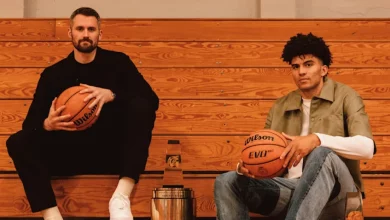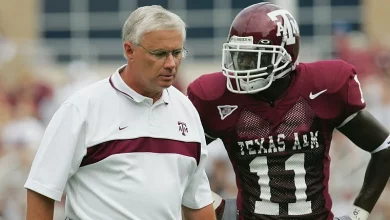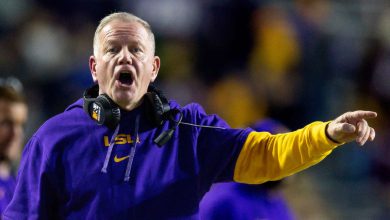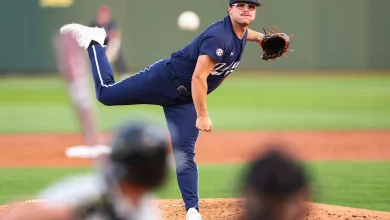Michael Taaffe of the Texas Longhorns Jokes About the Controversial Non-Call
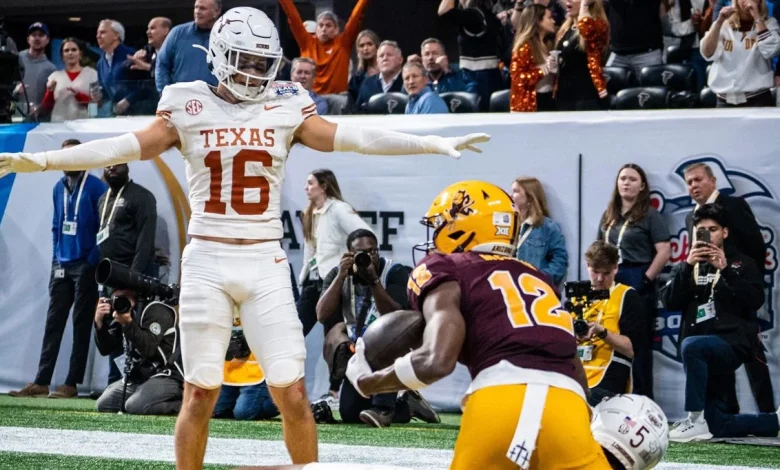
In the aftermath of the Texas Longhorns’ thrilling 39–31 double-overtime victory over the Arizona State Sun Devils in the 2025 Peach Bowl, one play stood out as a focal point of controversy and discussion: a helmet-to-helmet hit by Texas safety Michael Taaffe on Arizona State wide receiver Melquan Stovall. The hit occurred with just over a minute remaining in the fourth quarter, as Stovall caught a 10-yard pass on 3rd and 15. The officials reviewed the play for targeting but ultimately determined there was no foul. Had the call been made, it would have resulted in a 15-yard penalty, a first down for Arizona State, and a suspension for Taaffe in the first half of the upcoming Cotton Bowl. Instead, the Sun Devils were forced to punt, and Texas secured the victory shortly thereafter.
The Controversy Unfolds
The no-call sparked immediate reactions from various stakeholders. Arizona State head coach Kenny Dillingham expressed his confusion, stating, “I don’t know what targeting is,” highlighting the ambiguity surrounding the enforcement of the targeting rule. Former NFL official Terry McAulay and CBS Sports rule analyst Gene Steratore both opined that the hit met the criteria for targeting, further fueling the debate. Big 12 Commissioner Brett Yormark issued a statement calling for more consistency in officiating, underscoring the need for national standards in the College Football Playoff.
In the days following the game, Taaffe revealed that he had received hateful messages via text and social media from individuals upset over the non-call. He remarked, “The things that were thrown my way after that game… I don’t think anyone should have to go through,” shedding light on the personal toll such controversies can take on student-athletes.
Coach Sarkisian’s Defense
Texas head coach Steve Sarkisian defended Taaffe’s play, emphasizing the physical nature of football. He remarked, “We don’t play flag football, man. This isn’t 7-on-7. This is tackle football. We believe in playing a physical brand of football. We try to do it the right way within the rules.” Sarkisian acknowledged that there were numerous plays in the game where calls could have been disputed but maintained that the team would not alter its approach to the game.
The Bigger Picture
While the controversy surrounding the no-call was significant, it also highlighted broader discussions about the consistency and clarity of officiating in college football. The targeting rule, intended to protect players from head and neck injuries, has often been criticized for its subjective application. The Peach Bowl incident reignited calls for standardized enforcement and clearer guidelines to ensure player safety while maintaining the integrity of the game.
The Peach Bowl’s dramatic conclusion and the subsequent targeting controversy underscored the fine line officials must walk in making real-time decisions that can have profound implications on the game’s outcome. For Michael Taaffe, the incident served as both a testament to his aggressive playing style and a reminder of the scrutiny athletes face under the spotlight. As the Longhorns advanced to the Cotton Bowl, the echoes of that pivotal play lingered, prompting continued discussions about the evolution of officiating and player safety in college football.



